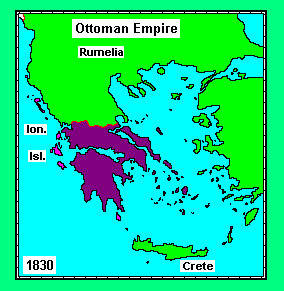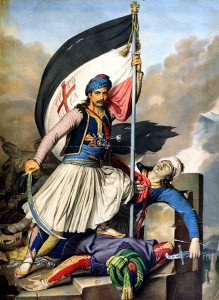THE CRISIS IN GREECE
The current financial crisis in Greece has been headlines around the world, not least because of the effect it might have on other European countries. This is by no means the first time that a crisis in Greece has caught the attention of Europe.
Nearly 200 years ago, when Greece was struggling to gain its independence, Europe found  itself deciding her fate. For several centuries Greece had been ruled by the Ottoman (Turkish) Empire. Their rule was notorious for its corruption and brutality. In the early 19th Century Greek patriots began to dream of re-creating an independent Greek state. They were inspired by the obvious decline of Ottoman power (Serbia had already gained a measure of self-government)and the new idea of Nationalism and hoped-for support from Russia, a fellow Slav and Eastern Orthodox country.
itself deciding her fate. For several centuries Greece had been ruled by the Ottoman (Turkish) Empire. Their rule was notorious for its corruption and brutality. In the early 19th Century Greek patriots began to dream of re-creating an independent Greek state. They were inspired by the obvious decline of Ottoman power (Serbia had already gained a measure of self-government)and the new idea of Nationalism and hoped-for support from Russia, a fellow Slav and Eastern Orthodox country.
The revolt broke out on 25th March 1821, still celebrated as Greek Independence Day in both Greece and Cyprus. When it started it was as much a protest against heavy taxes and corrupt officials as a demand for independence. The revolt quickly caught the attention of Europe, and in particular Great Britain.
The British government found itself in difficulty. On the one hand it was well aware of the  brutality and corruption of the Ottoman government. On the other hand, it was not the policy of the British government to encourage revolts against legitimate rulers. All states were supposed to support each other in maintaining the status quo. Britain had a particular reason to be anxious. It was widely (though wrongly) believed that Russia had encouraged, perhaps even organised, the Greek revolt to increase its power in the region. Any increase in Russian power would threaten Britain’s control of the Mediterranean and perhaps even India. Therefore Ottoman Sultan Mahmud II should ideally be encouraged to reform the administration, but Greece should stay in Turkish hands.
brutality and corruption of the Ottoman government. On the other hand, it was not the policy of the British government to encourage revolts against legitimate rulers. All states were supposed to support each other in maintaining the status quo. Britain had a particular reason to be anxious. It was widely (though wrongly) believed that Russia had encouraged, perhaps even organised, the Greek revolt to increase its power in the region. Any increase in Russian power would threaten Britain’s control of the Mediterranean and perhaps even India. Therefore Ottoman Sultan Mahmud II should ideally be encouraged to reform the administration, but Greece should stay in Turkish hands.
Unfortunately for this carefully balanced approach, there was huge sympathy amongst the Upper Classes in Britain for the Greeks. Public schools stressed the History of Ancient Greece with its enormous contribution, many would say invention, of civilisation. The well-educated could speak and read Classical Greek fluently. They believed the Greeks were fighting for European civilisation against the decadent, foreign and Muslim Turks. The Greeks must be supported!
As a result large numbers of volunteers went to fight on the Greek side. They were perhaps disappointed to find the Greek people no longer wore beautiful robes whilst discussing Philosophy, in fact they were mostly peasants who did not even speak Classical Greek. Lord Byron, Britain’s most famous poet, [pictured] was the best known of the idealistic men who fought, and in his case died, in Greece.
The final straw came when Sultan Mahmud, determined to crush the revolt, sent in the  well-trained Egyptian army. They were only too successful and accompanied their campaign with a reign of terror. In fact both sides committed terrible atrocities, but it was the Turkish atrocities, such as the massacre and enslavement of 30,000 people at Chios in 1823, that caught Europe’s attention.
well-trained Egyptian army. They were only too successful and accompanied their campaign with a reign of terror. In fact both sides committed terrible atrocities, but it was the Turkish atrocities, such as the massacre and enslavement of 30,000 people at Chios in 1823, that caught Europe’s attention.
Britain found itself forced to intervene by pressure of public opinion. In 1826, supported by Russia, it demanded that Mahmud grant Greece what was then called autonomy, and we now call Devolution, i.e. Greece would have its own government and make its own laws but still be part of the Ottoman Empire.
Mahmud unwisely refused this compromise. As a result the British navy wiped out the Ottoman fleet at the Battle of Navarino [1827]. Unable to reinforce his army in Greece, Mahmud was finally forced in 1830 to grant full independence to Greece. It was a much smaller state than the Greeks had wanted, but it was a start and over the next 120 years would grow to its present size. The Great Powers insisted that a German Prince be the King of Greece, the first but by no means the last time that Germany would have a major say in Athens.
The Greeks had fought hard and suffered terribly to achieve independence, but they could not have done it without the help of the Great Powers, particularly Britain. Greece had given Europe the civilisation we know. In the 1820s Europe helped repay the debt.
The History of Modern Greece will be the subject of a series of talks starting at the end of September for Paphos Third Age. The talks will be held at Droushia Heights Hotel. If you would like to find out more, please go to http://paphos3rdage.org/history_one.htm
By Wally Oppenheim








